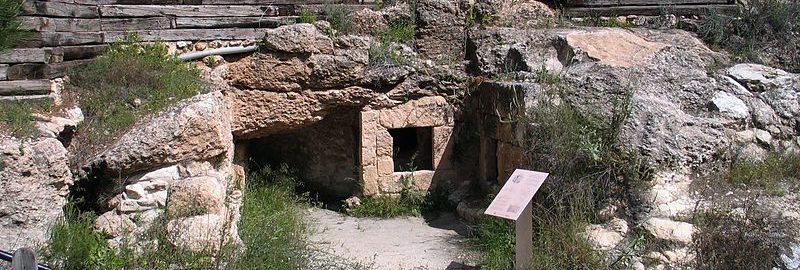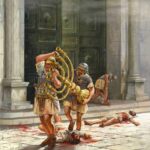Chapters
The relationship between the Romans and the Jews was extremely intense over the centuries. Initially, the relationship was based on trade and culture. However, with the expansion of Rome, relations became inflamed.
Rise of the Maccabees and the situation in Judea
The Jewish uprising against the Seleucids was caused by the decision of Antiochus IV to build an altar to Zeus in the Jerusalem Temple. Ancient Jews were divided, apart from religious and political parties such as the Essenes, Pharisees and Sadducees, there were disputes between the inhabitants of the Samaritans and Galilee and Judea Proper. Before the uprising, the Jews were divided into two groups differing in their views on Hellenism, the first pro-Greek camp was represented by wealthier merchants, however, and they differed, some longed for the power of Ptolemy, others considered the Seleucids to be good rulers. The second party (Chasidim) were enemies of Hellenism and consisted mainly of the poor and farmers. The first leader was Mattias of the Hasmonaean family, who, after refusing to sacrifice to the pagan gods and killing the Jew who wanted to do so, fled to the mountains. Other Jews joined him. After his death, Judah Maccabees became the leader, and under his leadership, Jerusalem was captured. In 161 BCE he sent a legation to Rome. This event is considered to be Judea’s first contact with Rome. The legation signed a treaty of friendship with Rome in which the senate undertook to order Demetrius I Soter not to attack the Jews. After Judah’s death, his brother Jonathan became the leader, who had managed to gain access to the Mediterranean Sea. As a result of the negotiations with the Seleucids, Judea practically gained independence, but it finally happened when the leader of the uprising was Simon Maccabees in 141 BCE.
State of the Maccabees and Pompey’s campaign
As civil war raged in Judea between the brothers Aristobulus and Hyrcanus, Pompey campaigned in the east. In 65 BCE he sent an officer, Marcus Scaurus, to Judea to investigate the matter. Hircan was supported by the Nabataeans, the officer, fearing that when he stood on his side, it would mean a Nabataean invasion of Judea, he opted for Aristobulus, many allies turned away from Hircan, and the Nabataean troops supporting him were crushed. Hircan, however, did not lose faith. Pompey himself came to Judea in 63 BCE. Both Aristobulus and Hirkan fought for their support. Ultimately, the chief supported Hirkana and, with the help of the Pharisees, conquered Jerusalem, but at the same time desecrated the temples, which enraged the Jews. Aristobulus was imprisoned.
Julius Caesar
Then a great civil war broke out in Rome between Julius Caesar and Pompey. Caesar initially planned to restore Aristobulus to the throne of Judea, who at that time was in a prison in Rome, but the former king of Judea was poisoned. During the Alexandrian war, the authorities of Judea decided to side with Caesar and Cleopatra. Herod, the son of Antipater, was awarded for this, and the advisers of Hirkana received Roman citizenship. Caesar favoured the Jews in Judea and throughout the empire. In 44 BCE Caesar was murdered, and it was the Jews who mourned him the most at his funeral.
2nd Triumvirate
Power over Judea was temporarily taken over by Cassius, but it soon fell under the rule of the triumvir of Marcus Antony, who was friendly to Jews. In 40 BCE Herod, the son of the late Antipater, was recognized by the Roman senate as king of Judea. During the Parthian invasion, Judea fell under their rule for a while. After the Romans recaptured these lands, Herod regained power. The agreement between Antony, Octavian and Lepidus did not last long. After Octavian had neutralized Lepidus who ruled Africa, a civil war broke out between Octavian and Antony. Herod was an ardent supporter of the latter. After Antony’s defeat at Actium and his suicide, Herod humbled himself to Octavian, who appreciated him.
Judea during the reign of the first emperors
Octavian continued the policy of his adoptive father Caesar towards Judea. Judea flourished under Herod, and Jesus Christ came into the world under Augustus. During the reign of subsequent emperors, there were clashes between the Romans and the Jews, mainly during the rule of Caligula. At that time, many Jews lived in various parts of the empire also in Rome. According to Suetonius, Emperor Claudius decided to banish Jews from the capital.
Roman-Jewish War
In 66 CE there was a Jewish revolt in Caesarea. The Zealots, religious fanatics, were the most rebellious party. The Romans sent the 12th Roman Legion stationed in Syria against the Jews, but they were defeated and forced to retreat. In 70 CE, the 12th Roman Legion entered Judea under the leadership of Consul Titus Flavius. Besieged, Jerusalem fell on September 11, 70. The city was demolished and the Temple of Jerusalem burned down. In 73 CE, the last defending fortress, Masada, fell.
Today Israeli soldiers take an oath by saying the words “Masada will never be conquered again.”
The rise of Bar Kochba
The leader of the uprising was Szymon Bar Kochba. As a result of the fighting, the Jews liberated the entire area of the province, including Jerusalem and the ruins of the Temple, where the sacrificial service was resumed. In total, the insurgents captured around 50 fortresses and around 1,000 towns and villages. During their independent rule, the insurgents minted their own coins. It was effective propaganda on these coins, for example, pictures of the facade of the Jerusalem temple and on the other side various inscriptions, e.g.
- Year One of Israel’s Redemption
- Israel’s Second Year of Freedom
- Freedom of Jerusalem
Emperor Hadrian summoned General Julius Sever and Quintus Lollius Urbikus from Britain, and the troops were brought as far as the Danube and Spain. In 135, the Romans entered Judea, starting fighting against the Jewish insurgents. They used the usual Roman tactic of dividing, isolating and liquidating subsequent insurgent enclaves. In the summer of 135, they captured Jerusalem. The Bethar insurgent headquarters southwest of Jerusalem fell as the last point of resistance in Galilee. Emperor Hadrian banned Jews from settling in Jerusalem, which he transformed into a Roman city.
More fate
Many Jews still lived in Judea, and there were minor uprisings, but they were quickly suppressed. The situation of the Jews worsened after the introduction of Christianity. Julian the Apostate, the only emperor who rejected the religion after Constantine’s conversion to Christianity, allowed the Jews to return to “holy Jerusalem, to be rebuilt, which you longed for so many years”, and to rebuild the Temple itself. However, he died on June 29, 363 in battle during his unsuccessful campaign against the Sassanids, and the Temple was not finally rebuilt.
Jewish life in the city of Rome
Jews have lived in Rome for over two thousand years, longer than in any European city. They founded a community there in the 2nd century CE, because in 139 BCE. Praetor Hispanus issued a decree to expel the astrologers which affected all non-Italian Jews. Julius Caesar, the Roman dictator, was very friendly to Jews not only in Judea but also to those living in Rome. He introduced many amenities for them, which Augustus maintained. They allowed the Jews to freely profess their religion and cultivate their traditions. After Augustus’ death, Tiberius became the emperor. In practice, however, the most important man in Rome was Sejan – the praetorian prefect. He was very reluctant towards Jews, many of them had to leave Rome after the death of Sejanus, Emperor Tiberius let them come back. Emperor Claudius was not hostile to the Jews at first, but he expelled some of them for inciting riots. Nero’s reign was a quiet time for the Jews because Nero, Poppaea Sabina was accommodating. The situation of the Jews depended on the emperor’s attitude towards them, many emperors were friendly towards Jews, such as Caracalla, Septimius Sever and Alexander Sever, who was called “archisynagogus”. After adopting Christianity, their situation gradually changed for the worse, they were often treated as second-class citizens.








